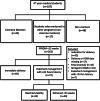Insights into the Value of Student/Student Mentoring from the Mentor's Perspective
- PMID: 34457533
- PMCID: PMC8368820
- DOI: 10.1007/s40670-019-00739-9
Insights into the Value of Student/Student Mentoring from the Mentor's Perspective
Abstract
Objective: Determine and describe the impact of student/student mentoring (SSM) on the senior medical student mentor involved in a formal SSM program.
Method: An anonymous online survey was administered to fourth-year medical students at the University of North Carolina with questions regarding participation in SSM programs (formal and informal) as well as the impact of these experiences. Responses from fourth-year mentors were compared to non-mentors' answers. Data was analyzed to assess the value of, understand motivations for not participating in, and to describe perceptions regarding SSM.
Results: One hundred seven of 178 students in the fourth-year class completed the survey, a 60% response rate. Forty-two students participated in the formal SSM program, 48 did not have mentors (non-mentors), and 17 were excluded as they participated in informal mentoring programs. There were no differences in gender, age, or matched specialty between mentors and non-mentors. Ninety-five percent of all students agreed that SSM was valuable in a way that was different from student/resident or student/faculty mentoring. Mentors were nearly twice as non-mentors likely to believe that being the mentee in an SSM relationship would be beneficial. In addition, mentors were 4 times more likely to believe that being a mentor in an SSM program was valuable and 83% stated they would mentor again. Lastly, nearly three quarters of mentors felt that this was a worthwhile experience.
Conclusions: Students who served as mentors as part of an SSM program had positive experiences and found it a valuable addition to traditional faculty/student mentoring.
Keywords: Academic mentoring; Medical student; Mentee; Peer to peer.
© International Association of Medical Science Educators 2019.
Conflict of interest statement
Conflict of InterestThe authors declare that they have no conflict of interest.
Similar articles
-
The Rising Physicians Program: A Novel Approach for Mentoring Medical Students.Mil Med. 2019 May 1;184(5-6):e164-e167. doi: 10.1093/milmed/usy289. Mil Med. 2019. PMID: 30423166
-
Mentoring on Orthopedic Surgery Clinical Rotations: A Survey of Mentor Effectiveness on Student Mentees Compared to an Unmentored Control Group.J Surg Educ. 2023 May;80(5):697-705. doi: 10.1016/j.jsurg.2023.02.007. Epub 2023 Mar 6. J Surg Educ. 2023. PMID: 36890044 Clinical Trial.
-
Benefits of Mentoring in Oncology Education for Mentors and Mentees: Pre-Post Interventional Study of the British Oncology Network for Undergraduate Societies' National Oncology Mentorship Scheme.JMIR Med Educ. 2023 Sep 11;9:e48263. doi: 10.2196/48263. JMIR Med Educ. 2023. PMID: 37695662 Free PMC article.
-
Peer mentoring in pharmacy programs: Recommendations for implementation based on a review of available literature.Curr Pharm Teach Learn. 2024 Jun;16(6):496-502. doi: 10.1016/j.cptl.2024.03.014. Epub 2024 May 1. Curr Pharm Teach Learn. 2024. PMID: 38692946 Review.
-
Mentoring programs for medical students--a review of the PubMed literature 2000-2008.BMC Med Educ. 2010 Apr 30;10:32. doi: 10.1186/1472-6920-10-32. BMC Med Educ. 2010. PMID: 20433727 Free PMC article. Review.
Cited by
-
Peer Mentoring by Medical Students for Medical Students: A Scoping Review.Med Sci Educ. 2024 Jul 4;34(6):1577-1602. doi: 10.1007/s40670-024-02108-7. eCollection 2024 Dec. Med Sci Educ. 2024. PMID: 39758463 Free PMC article.
References
-
- Crisp GCI. Mentoring college students: a critical review of the literature between 1990 and 2007. Res High Educ. 2009;50(6):525–545. doi: 10.1007/s11162-009-9130-2. - DOI
-
- Merriam-Webster Inc . Merriam-Webster’s dictionary of law. Springfield. Massachusetts: Merriam-Webster, Incorporated; 2016.
-
- Cohen NH. Development and validation of the principles of adult mentoring for faculty mentors in higher education [dissertation]. Philadelphia: Temple University; 1993.
-
- Jacobi M. Mentoring and undergraduate academic success: a literature review. Rev Educ Res. 1991;61(4):505–532. doi: 10.3102/00346543061004505. - DOI
-
- Allard WG, Dodd JM, Peralez E. Keeping LD students in college. Acad Ther. 1987;22(4):359–365. doi: 10.1177/105345128702200403. - DOI
LinkOut - more resources
Full Text Sources

